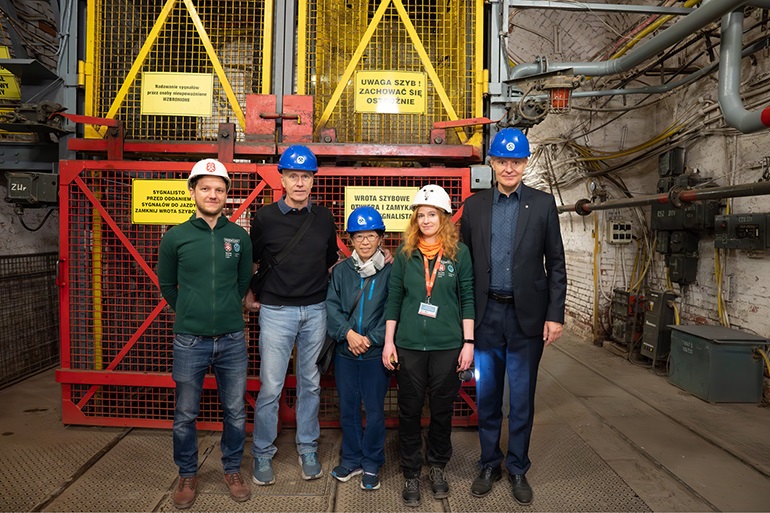Start - Aktualności - Prof. Brian Kobilka in Upper Silesia

Prof. Brian Kobilka in Upper Silesia
A Nobel Laureate, Prof. Brian Kobilka, who will receive the title of Doctor Honoris Causa of the Silesian University of Technology on May 30th, visited some of the region's attractions. On Sunday, May 28th , together with his wife, he saw the Gliwice Radio Station, the Guido Mine and the historic Nikiszowiec housing estate in Katowice. It was the professor's first visit to our region.
The radio station in Gliwice, the Guido mine in Zabrze, as well as the NOSPR headquarters, the Silesian Museum and the Nikiszowiec housing estate in Katowice - these are the attractions visited by prof. Brian Kobilka and his wife. Thus, the outstanding scientist and Nobel Prize winner had the opportunity to learn about the history and culture of the region.
- It was very interesting to learn so much about your region, about its history. My ancestors come from the Czech Republic, which is basically from the surrounding area. It was a really interesting day. I learned a lot about the mining industry, I was not at all aware of what mining in Poland could look like and how important it was in the development of this region - said prof. Brian K. Kobilka
The scientist and his wife visited the Guido mine, where the operation of mining machines and facts concerning the hardship of mining work were presented. In Katowice, in turn, in the Silesian Museum, Mr. and Mrs. Kobilka saw an exhibition devoted to the history of Upper Silesia.
- People are very friendly here. I learnt a lot about the complicated history of Silesia. It is an interesting experience to see what the region is like today, but also to find out how bravely the inhabitants endured these constant historical changes. I am curious if young people have learned from this past, said Tong Sun Kobilka after seeing the exhibition at the Silesian Museum.
American scientists did not hide their admiration for Katowice's architecture, both the historic one during a walk around the Nikiszowiec estate and the modern one at the headquarters of the National Polish Radio Symphony Orchestra.
- We wanted to show Upper Silesia as it is today, but also as it used to be. It is a piece of very interesting, unique history. Our guests have already been to the most attractive places in the world, and this time they saw something completely different. They were very interested, they wanted to see what the cities where the Silesian University of Technology conducts its activities look like. We chose only a few places, but thanks to their uniqueness, it is possible to feel the specificity of Silesia and its unique atmosphere - said prof. dr hab. Eng. Marek Pawełczyk, vice-rector for science and development of the Silesian University of Technology, who accompanied the guests on a tour of the region and who inspired the invitation of prof. Kobilka and is the promoter of his Doctorate Honoris Causa.
Professor Brian Kobilka will be 54th Doctor Honoris Causa of the Silesian University of Technology and at the same time the first the Nobel Prize winner to be awarded this title. The scientist received the Nobel Prize in 2012 together with Robert Lefkowitz for research on G protein-coupled receptors. These studies have contributed to significant progress in cell biology and medicine.
Ceremony of awarding the title of Doctor Honoris Causa to prof. Brian Kobilka will take place on May 30th , 2023, at 11:00 at the Education and Congress Centre of the Silesian University of Technology.









